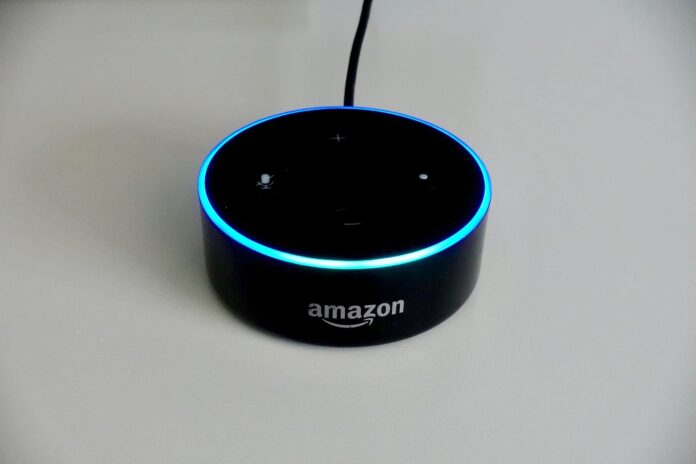Is Amazon Alexa AI? Amazon’s digital voice assistant is one of the market leaders in a small field whose products are evolving through the continued refinement of machine learning techniques. But is Alexa AI or artificial intelligence in and of itself, or is Alexa an AI in some other sense? For example, is Alexa an AI device?
To answer these questions, we need to step back and take a look at some of the more fundamental principles involved.
What Is AI?
AI or artificial intelligence is a broad term for a branch of computer science that spans multiple disciplines, all with the similar aim of creating systems and machines capable of performing tasks that were previously only possible within the realm of human reasoning, perception, or learning.
Many researchers and developers’ long-term objective in this field is artificial general intelligence (AGI), or strong AI. This describes a state where machines will be capable of performing tasks in a manner equal to or beyond the capacity of humans. We’re certainly not there yet and are unlikely to reach this level for some years.
In the meantime, what we have is weak or narrow AI, which consists of specialist systems designed to perform a single specific task or a narrow range of tasks extremely well.
Part of what’s enabling this current AI level is a division of artificial intelligence known as machine learning. Here, machines collect and process vast amounts of information, analyze it to identify patterns, use these observations to make decisions, and improve the system’s performance over time.
So, in light of all this, is Alexa AI or machine learning? To begin to answer this, we’ll need to understand what Alexa actually is.
What Is Alexa?
Amazon Alexa is a voice-controlled digital or virtual assistant program that accepts voice commands to create to-do lists, order items online, set reminders, and answer questions (via internet searches).
Alexa has close integration with the Amazon Echo and Dot smart speakers. Owners of these systems can use voice commands to ask natural language questions, play music, order pizza, hail an Uber, and integrate Alexa with smart home devices. To date, more than 100 distinct products have Alexa built-in.
Alexa AI Technology
Alexa and others’ ability in the virtual assistant space like Google Assistant and Apple’s Siri to respond to user input and execute commands is largely dependent on artificial intelligence, automation, and machine learning technologies. How does Alexa use AI?
Starting from 2018, machine learning technology has been expanding the capabilities of Alexa. During that year for example, Alexa learned how to carry over context from one query to the next and register follow-up questions without users having to repeat the system’s wake word. The platform also gained the ability to handle multiple requests simultaneously and allow users to call up a skill (one of Alexa’s range of onboard apps) without knowing its exact name.
Active learning technology has enabled the system to identify areas where it needs help from a human expert, substantially reducing Alexa’s error rates. The feature extends to Alexa’s speech recognition and natural language understanding mechanisms.
The introduction of a system known as transfer learning to Alexa triggered a 25 percent reduction in its error rate over the course of a year. In essence, the system employs deep learning (an advancement in machine learning that uses artificial neural networks modeled on the human brain) to model many domains and transfer that learning to a new domain or skill.
Does Alexa use AI in other ways? Well, the launch of self-learning technology on the platform has enabled Alexa to make corrections based on context clues automatically. An example would be if you ask your Echo to play a certain named radio station, and the request fails because Alexa doesn’t catalog the station in that way. If you reference the station in another way, like “play Sirius channel 53,” self-learning enables Alexa to associate the first name with this second reference, and respond correctly the next time you ask.
In 2020, Amazon is making Alexa smarter through natural turn-taking, having conversations with multiple people, natural language understanding, and the ability to be taught by its users. The first target for these improvements is the smart home, with features such as Reading Sidekick, (a tool designed to help kids read), and conversational improvements aimed at making Alexa more of a family member without as many “Alexa” words. Alexa for Business is likely to follow with related improvements.
Amazon’s new Echo devices are evolving to become more like smart home edge computing devices at the infrastructure level. They are now using the company’s AZ1 Neural Edge processor, which offers 20 times less power consumption, double the speech processing, and 85% lower memory usage.
But is Alexa considered AI? Not as such, but it’s certainly a system that’s using AI technology and techniques to become smarter and more versatile. In its current format, the system boasts the following capabilities:
- Alexa can take interaction cues, take note of errors, and then connect them.
- Alexa can learn from humans by asking follow up questions when there’s a gap in knowledge about returns and learned modes.
- Deep learning space parsers allow Alexa to understand gaps and extract new concepts.
- The system now features more natural conversation and adaptation.
- Alexa now has a follow-up mode when interacting with humans.
- Natural turn-taking is the ability to use visual and acoustic cues to determine the best action to take and allow people to interact with Alexa at their own pace.
Is Alexa The Best AI Assistant On The Market?
There are conflicting views on this. A recent comparative review of Alexa and its two main competitors (Google Assistant and Siri) throws up a mixed bag of results. Among the main points:
- The best Google Home compatible devices aren’t necessarily better than the best Alexa compatible devices or the best HomeKit devices.
- All three assistants offer some form of multi-room audio facility, including creating groups of speakers via your smartphone.
- Thanks to its tight integration with Amazon, Alexa has the edge when it comes to handling purchase requests.
- Siri wins out when it comes to communications, with streamlined calls and text on the iPhone, and options to have emails and text messages read back to you.
- With Google Maps integration, Google Assistant is top of the heap when it comes to navigation and travel time estimates.
- In terms of voice recognition, Google Assistant and Alexa have the edge over Siri.
- With more than 70,000 third-party skills, Alexa offers the widest selection of apps.





